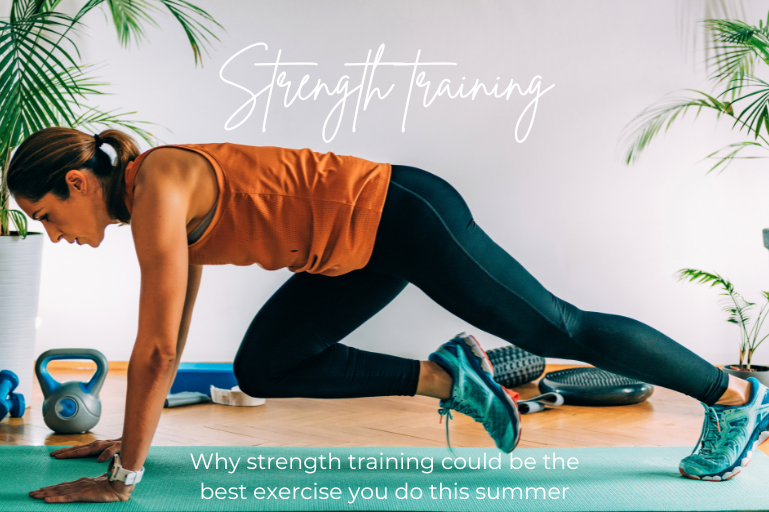
Why strength training could be the best exercise you do this summer
Posted by Claire Boote, on July 10, 2024. Tags: Fitness, Health benefits, Wellbeing

Posted by Claire Boote, on July 10, 2024. Tags: Fitness, Health benefits, Wellbeing
Major sporting events often cause a spike in interest in a particular exercise (just try and book a regular tennis court during Wimbledon fortnight, or resist pretending to be an Olympic long-jumper in the children’s sandpit). But soon after the medals and trophies have been awarded, the enthusiasm from us amateurs tends to wane. But we reckon there’s one exercise that’s worth sticking to all summer and beyond – one that will keep you fit and healthy, and complement any other sport you choose to do.
It’s surprisingly simple – it’s strength training. Here’s what that means and why you should include it in your exercise routine…
:sharpen(0.5,0.5,true)/https://www.royce-lingerie.co.uk/static/uploads/2024/07/training-blog.png)
‘Strength training’ is an umbrella term that covers exercise involving free weights (such as dumbbells, barbells), gym machines (anything weighted such as the abductor or lat pulldown machine), resistance bands, and bodyweight exercises (such as plank, press ups, lunges).
Lifting, pushing and pulling weights repetitively, and increasing the load as you progress, builds and sculpts muscle. In the past, many women have been wary of taking up strength training believing it would create a bulky, overly muscular body, but female biology just doesn’t work like that.
A healthy strength training routine can result in a leaner, more toned physique and (obviously) a stronger body which is particularly important as we age and lose muscle mass. A strong body can help prevent injury and provide a solid base for other forms of exercise.
:sharpen(0.5,0.5,true)/https://www.royce-lingerie.co.uk/static/uploads/2024/07/training-blog-1.png)
Strength training can be tough, but it doesn’t involve high-intensity movement so is gentler on our joints. Another key benefit, particularly in midlife and beyond, is that it can help you maintain strong, healthy bones. In women, bone density declines as oestrogen declines in perimenopause, leaving us prone to conditions such as osteoporosis later in life. Studies have shown that regular strength training can boost bone density which helps lower this risk.
Unlike cardio workouts (spinning, running, HIIT) strength training can be done slowly and steadily (many describe it as quite a relaxing mindful activity). This helps avoid spikes in cortisol, the stress hormone, keeping your body and mind on an even keel, while still reaping the mood-elevating benefits of an endorphin release from exercise.
If you’re feeling low, a weights session at the gym or a bodyweight workout at home could be just the ticket – a meta-analysis published in the journal JAMA Psychiatry found that lifting weights reduced the symptoms of low mood in those experiencing mild to moderate depression.
Whether you’re in your early weeks and feeling a little vulnerable or nauseous, or in the late stages and struggling to move without a waddle, gentle strength training workouts can be a great way to stay fit without the physical demands of high-intensity exercise.
Specific exercises that target your glutes, leg and back muscles will help support your bump as your baby grows, and any total body strengthening moves will help get you fit for labour and the post-partum months. However, always consult your doctor or midwife before undertaking a new exercise and consider adaptions, even if you’re already a regular at the gym – your body goes through continual change throughout pregnancy putting you at higher risk of injury at certain times. Check out Women’s Health magazine’s tips for strength training during pregnancy safely.
If you can, take advantage of a free introductory session with a fitness instructor at your local gym who can show you what to do with the equipment safely and effectively. Alternatively, take an experienced friend along for a joint workout (exercising with friends is a good motivator too).
Many workouts can be done at home, whether you have dumbbells or no equipment at all. Try one of these to get started…
You may not be jumping around, but a well-fitted sports bra is still essential for your strength training workout. Browse our range including the “game changing” Aerocool (for G-K cups), Impact Free (for G – K cup), Impact Free Adjustable Fit (for A-D cups), or Lola (AA-DD cups) for low-impact sessions.
Find your local stockist